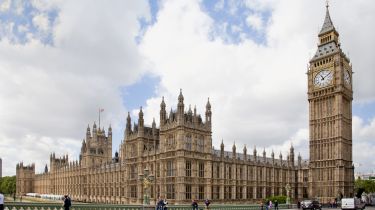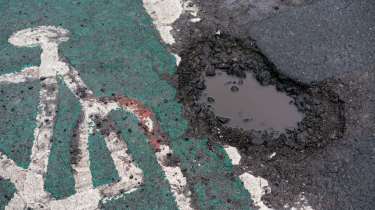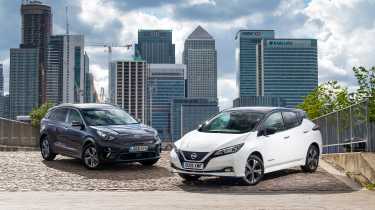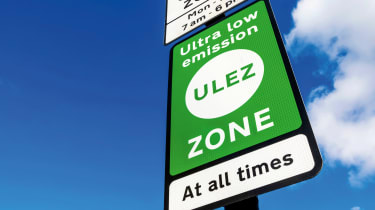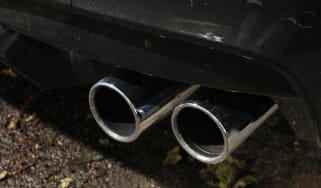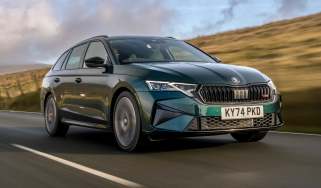Election 2024 exclusive: Labour and Conservatives map out their plans for cars and motorists
Parties go head-to-head as their representatives for roads and transport policy respond to our top-10 motoring challenges
With polls suggesting that Conservative Transport Secretary Mark Harper could soon be replaced by his Labour shadow, Louise Haigh, Auto Express has challenged both to provide their solutions to the issues we think matter most to motorists, based on our own Motoring Manifesto.
If you’re still undecided and want to know who best represents your interests as a driver, check out the responses from the two chief protagonists battling for your vote. We’ve also rounded up policy highlights from the other major parties in the General Election.
1. When will you ban ICE car sales?
Mark Harper, Conservative
“The original plan was to phase out all new ICE cars except hybrid cars by 2030, and then allow hybrids until 2035. We changed that to allow all engines till 2035 because the evidence showed modern ICE engines are just as carbon efficient as hybrids, but also cheaper for consumers. Labour’s plan to end all ICE sales by 2030 is reckless and will price normal people off the roads by forcing the transition before industry is ready.”
Louise Haigh, Labour
“After the chopping and changing of the Conservative government, the automotive industry is crying out for certainty. Labour will deliver that by restoring the 2030 phase-out date for new petrol and diesel sales. This transition will grow our economy and secure the future of the UK’s automotive industry.
“Electric cars are already cheaper to run and will soon be cheaper to make than petrol cars. More delay means higher costs for drivers, billions in investment lost and more jobs shipped overseas.”
2. How will you fix the UK’s potholes?
Mark Harper, Conservative
“When I became Secretary of State for Transport, a third of all the money we spent as a country on transport went on HS2 [rail project]. Cancelling the second phase was a tough decision, strongly opposed by Labour at the time, but
it let us free up £8.3billion to invest in roads across the country."
“That is already starting to make a difference – but of course there’s more to do, particularly following the terrible winter last year. That’s why our manifesto commits us to bring forward funding in the next two years, and we will set out how the £8.3billion will be allocated within the first 100 days of being re-elected. This will allow local councils to plan and invest in better equipment, so we’re resurfacing roads, not just patching them up.”
Louise Haigh, Labour
“I know this issue really matters to Auto Express readers. And it’s little wonder. Britain is in the midst of a pothole crisis. Fourteen years of Tory government has left our roads in a state of neglect."
“Labour is the only party truly on the side of drivers. Our plan will fix up to a million more potholes every year by redirecting existing road funding."
“Crucially we will provide councils with long-term funding so roads are fixed for the long-term – not just patching them up."
3. Will you ensure drivers have access to affordable car insurance?
Mark Harper, Conservative
“The rise in premiums is due to a range of factors and so it’s important to look to tackle the root causes rather than just criticise the insurers. For example, car crime has risen, particularly in urban areas such as London, so local mayors and police need to do more to tackle this.
“As part of our Plan for Drivers, we are already taking steps with the insurance industry to tackle the root issues and recently concluded a consultation on removing the right of uninsured drivers to claim compensation for property damage.”
“In contrast, Labour’s ideas such as ‘ending the postcode lottery’ don’t make any sense and have been criticised as illogical by the insurance industry. Moving away from postcode-based pricing could mean drivers in safer areas paying the price for car crime in places such as London.”
Louise Haigh, Labour
“Car insurance isn’t a luxury – it’s a legal requirement and an essential for millions. But under the Conservatives, the cost of cover is out of control due to unfair practices, soaring inflation, pothole-ridden roads and rising thefts.
“Labour will urgently call in the regulators to crack down on soaring costs for drivers. And our pledge to fix up to a million more potholes every year will save drivers hundreds of pounds in lower repair bills and insurance premiums.”
4. How will you crack down on soaring car crime?
Mark Harper, Conservative
“To help tackle all crimes including car theft, we will give every neighbourhood an additional police officer by recruiting 8,000 more police officers to patrol communities and catch criminals in every ward in the country. These full-time, fully-warranted officers will be dedicated to neighbourhood policing. We will also fund every police force to roll out Hotspot Policing, which has cut anti-social behaviour by up to 50% in some areas.”
Louise Haigh, Labour
“Over the last year the number of car thefts has soared, while over 20 million people experience or witness antisocial behaviour – as police patrols have been cut back. We will reverse the plummeting rates of criminal charges and prosecutions, driving up the proportion of crimes solved by reducing barriers to bringing charges, cutting bureaucracy, and improving collaboration."
5. What about incentives for people buying EVs?
Mark Harper, Conservative
“The UK’s main tax incentive to buy EVs is salary-sacrifice leasing, and leasing generally has never been more popular for car purchasing – but all of those private purchases for individuals get counted as “fleet” for industry statistics. Government’s job is to make it easier to choose EVs, pump priming things like chargepoint rollout and charging for people without off-street parking, not directly subsidising cars.”
Louise Haigh, Labour
“One of the biggest barriers to making the switch to an electric vehicle is the lack of public chargepoints. The infrastructure for electric vehicles is simply not good enough. There are more public chargers in London than in the entire North of England combined.
“That’s why we will focus on improving the electric vehicle charger rollout so that more people feel they can make the switch. And by reinstating the original 2030 phase-out date for new petrol and diesel car and van sales, we will give the electric vehicle sector the certainty it needs to flourish.”
6. Do you have a plan to speed up chargepoint roll-out?
Mark Harper, Conservative
“There was a 49 per cent increase in chargepoints in the last year, and the latest figures show a 43 per cent increase year-on-year to May – taking us to over 62,500 public chargepoints. We are on track to hit the goal of 300,000 by 2030. Charge UK members have over £6billion of private sector investment ready to go – and they will ensure this happens much more efficiently than any state-run effort.”
“Government has an important role to play – in getting rid of red tape, particularly council planning and permitting, and with the electricity grid – which is why we invested over £185million extra in helping remove this sort of obstruction. We’re also helping people without off-road parking to charge at home – investing in both low-power on-street charging, and things such as charging gully trials.”
Louise Haigh, Labour
“We know that progress has been far too slow. That’s why a Labour government will accelerate the electric vehicle charging rollout by setting new locally-binding targets. We will remove planning barriers holding up the delivery of chargepoints, support local authorities with better guidance on the use of chargepoint funding, and review the effectiveness of existing funds to ensure funding is targeted at the right places.
“And we will remove barriers to securing grid connections and facilitate the largest upgrade to our national transmission infrastructure in a generation.”
7. What is your policy on low-emissions zones?
Mark Harper, Conservative
“Labour broke low emission zones when the Mayor of London went back on his word and expanded ULEZ across all of London. That was evidently about raising money by taxing the poorest motorists, not about air pollution."
Air pollution across the country is at its lowest recorded level (apart from lockdown) and will keep falling as more people choose EVs. There should be less and less reason for anyone to impose charging clean-air zones, and councils should review those that currently exist as pollution improves.”
Louise Haigh, Labour
“We have no plans to extend ultra or low emission zones. Under a Labour government, improved public transport in our towns and cities will be a game-changer for air quality. This really matters for drivers too, because it will relieve congestion on our roads.”
8. What is your approach to fuel duty and fuel price competition?
Mark Harper, Conservative
“Our manifesto re-affirms our commitment to delivering our Pumpwatch scheme that will force petrol retailers to share live information on their prices, boosting competition in the market and driving down prices at the pump. The consultation on the shape of this scheme closed in March, so we would move quickly to introduce it if re-elected.
On fuel duty, our record speaks for itself. We’ve frozen fuel duty at every budget since 2010, saving families more than £1,000, and we are committing to stop pay-per-mile road pricing, which is seen by many as the successor tax.
We will boost our energy independence in an increasingly unstable world by legislating to ensure annual licensing rounds for oil and gas production from our own North Sea. In contrast, Labour are committed to shutting down the North Sea, rejecting any new licences. This would leave the UK more dependent on foreign powers and could lead to higher prices at the pump.”
Louise Haigh, Labour
“Drivers are right to feel ripped off. When the price of crude oil increases, people immediately see an increase at the pump – but when the price drops, those savings are not passed on. If we get into government, we will explore options to address this as it’s fundamentally unfair.
“And on fuel duty – we want lower taxes on working people, which is why we’ve always campaigned against
fuel duty rises in this Parliament. Nothing in our plans requires us to raise any additional money beyond measures already announced.”
9. Should there be an end to blanket 20mph zones?
Mark Harper, Conservative
“Yes. Our manifesto is clear – 20mph limits are fine in the right place, such as outside schools, with local support, but they shouldn’t be imposed as a blanket anti-car measure, particularly on main roads. We’ll introduce a Backing Drivers Bill as soon as possible, which will enshrine in law the requirement for local support for any new 20mph zones and give local people the right to challenge unpopular existing zones.”
Louise Haigh, Labour
“It should be up to local communities to decide the speed limits on their local roads, not politicians in Westminster. 20mph limits are welcome in certain areas such as around schools – but those decisions should be made locally. That’s why a Labour Government will not introduce blanket 20mph zones.”
10. Will you address the lack of visible roads policing?
Mark Harper, Conservative
“We have already recruited 20,000 additional police officers, which means more officers on our roads. Technology such as cameras is important to work alongside these officers to give them the tools they need. We are determined to crack down on anti-social behaviour and will fund every force to roll out Hotspot Policing, which has cut anti-social behaviour by up to 50 per cent in areas.”
Louise Haigh, Labour
“Labour will introduce a new Neighbourhood Policing Guarantee, restoring patrols to our town centres by recruiting thousands of new police and community support officers, and special constables. Communities and residents will have a named officer to turn to when things go wrong. These new recruits will be paid for by tackling waste through a new Police Efficiency and Collaboration programme for England and Wales.”
What the other parties have to say
Liberal Democrats
- Reinstate the 2030 ban on the sale of ICE cars with the stipulation that all new cars and LCVs sold from this point onwards emit zero emissions.
- Reintroduce the discontinued plug-in car grant to make buying a new EV cheaper.
- Roll out more public and on-street chargepoints, and reduce public-charging VAT to five per cent, bringing it in-line with the cost of home charging.
- “Protect motorists from rip-offs, including unfair insurance and petrol prices” by launching an investigation into sky-high fuel prices and expanding Rural Fuel Duty Relief to more parts of the country, including Cornwall, Yorkshire and rural areas of Scotland and Wales.
- Pledge £600million to fix Britain’s potholes, plus provide local authorities with more power and cash to maintain roads.
SNP
- Establish a new Low Income EV Car Leasing Fund, just like the one in France. This would cost £500million and “enable 50,000 EV leases a year to benefit low-income families”.
- Quadruple number of public EV chargers in Scotland to 30,000 by 2030.
- Devolve road tax and fuel duty to Scottish Parliament and eliminate VAT when using on-street EV chargers.
- Reverse £1.3billion cut to Scottish capital budget to fund roads and other infrastructure, as well as “press the UK Government to fulfil their commitment to fund improvements to the A75”.
- All “appropriate roads in built-up areas will have a safer speed limit of 20mph by 2025”.
Reform
- Scrap UK’s net zero targets, including the planned ban on the sale of new ICE cars.
- Remove the ZEV mandate and ensure there’s “no legal requirement for manufacturers to sell electric cars”.
- Ban and remove all ULEZ and other Clean Air Zones.
- Push for a 20 pence per litre cut to fuel duty and support the existing Pumpwatch scheme.
- Redirect £25billion of HS2 funds into improving local rail and road infrastructure in “coastal regions, Wales, the North and the Midlands”.
- Increase police presence to 200 officers per 100k population and set up “specialist car theft prevention teams”.
- Reverse existing 20mph speed limit zones, “unless they are located near schools”.
Green Party
- Ban the sale of new petrol and diesel cars by 2027 and forbid their usage on UK roads by 2035.
- Pledge £5billion per year into petrol and diesel vehicle scrappage scheme.
- Invest in zero-carbon energy to support transition to EVs and rollout of electric car chargers.
- Reform VED (road tax) system to be calculated “proportional to vehicle weight”.
- Restore fuel duty “escalator” (i.e. the gradual annual increase on fuel duty) and “as revenue declines, favour the introduction of road-pricing schemes”.
- Oppose all new road-building plans by reallocating funds into electrifying public transport and setting up cycle paths.
- Make 20mph the “default speed limit on roads in all built-up areas”.
Which policies would you like to see introduced? Tell us your thoughts in the comments section below...

